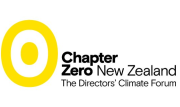
Don’t centralise sustainability – embed it: Michael Kobori at Chapter Zero
At Chapter Zero NZ’s final 2025 event, global corporate sustainability leader Michael Kobori shared lessons from Levi’s and Starbucks.
“You don’t scale sustainability by centralising it,” said Michael Kobori. “You do it by embedding it in the business – in supply chain, operations, development, product, and even executive compensation.”
Kobori, former Chief Sustainability Officer at Starbucks and Vice President of Sustainability at Levi Strauss & Co, was speaking to nearly 200 members at Chapter Zero NZ’s final event for 2025 in Auckland. Interviewed by Ross Buckley CMInstD, Kobori shared candid reflections from over three decades at the forefront of corporate sustainability, including what he calls the value of failure.
He recalled one early lesson at Levi’s, when the company developed an “Eco Jean” made from organic cotton, using natural colours and no chemicals. It was ahead of its time – and it didn’t sell.
“We forgot that the jeans still had to make your butt look good,” he said. “We failed to deliver on the brand promise.”
“Number one: companies must deliver on the brand promise. Once you do that and add sustainability onto it, that’s when it becomes a differentiator – and you win.”
Kobori also described how timing plays a role in sustainability leadership. At Levi’s, he pushed to phase out PFAS chemicals before they were legally banned. The business didn’t act immediately – but when data and public pressure grew, the work accelerated.
“Sometimes your recommendation is the right one, it’s just the wrong timing.”
When he joined Starbucks, Kobori resisted the temptation to build a large sustainability department. With 400,000 employees, his team numbered just 12.
“But it wasn’t just 12 people working on sustainability – it was hundreds. We embedded sustainability into the business.”
He established a US$50 million internal Sustainability Innovation Fund, allowing business units to apply for long-term projects without immediate ROI.
“That’s how you get scale – not by centralising sustainability, but by embedding it.”
Linking climate action to value
Asked how to maintain momentum in a slow-moving environment, Kobori acknowledged the emotional challenge.
“We care deeply about the environment and we know our companies must act. But we also have to stay positive while acknowledging the challenges.”
His key message: sustainability must support the business.
“We’re doing this to grow our business; to manage risk, drive productivity and unlock value. As long as we stay focused on that, we can’t be accused of doing the wrong thing.”
He encouraged leaders to close the communication gap between sustainability and finance functions.
“In general, sustainability people don’t understand finance, and finance people don’t understand sustainability. We must make friends and understand what drives the company financially – and show how sustainability can help.”
At Starbucks, he partnered with the company’s treasurer to invest US$400 million in renewable energy projects across the US.
“There was a tax break, a policy incentive – and we made money on it. The treasurer loved it. And we achieved our sustainability targets.”
Partner spotlight: ASB and Chapter Zero NZ
ASB has been partnering with the Institute of Directors to sponsor Chapter Zero NZ events since 2023 and is actively engaged with business customers to help progress New Zealand’s transition to net zero by 2050.
“ASB is committed to climate and sustainable initiatives, and Chapter Zero is an excellent advocate in thought leadership and ensuring executives, boards and New Zealand leaders are able to access and learn from both national and international challenges and opportunities,” said Alison Terry CMInstD, ASB Head of Professional Business.
In its 2025 Sustainability Report and Climate Statement, ASB reported a 31% reduction in operational emissions compared to its FY20 baseline, and $2.1 billion in lending to support customers’ sustainability initiatives since FY22, moving towards its ambition of a cumulative Sustainability Funding Target of $6.5 billion by FY30.
“While achieving further reductions is expected to be increasingly complex, as many of the more accessible opportunities have already been addressed, we are committed to continued progress through more targeted strategies,” said Carrie Gage, ASB General Manager of Sustainability.
She added that customers now have “more access to sustainable finance options, expert guidance and practical tools to support their sustainability journey.”





